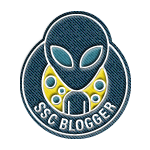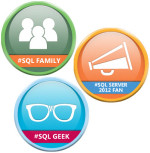 Just as a butterfly takes time to change from a caterpillar, I too have been changing this year. I had a set of goals that started forming last July and were solidified by December. Now I’m ready to take flight on one of those goals.
Just as a butterfly takes time to change from a caterpillar, I too have been changing this year. I had a set of goals that started forming last July and were solidified by December. Now I’m ready to take flight on one of those goals.
I started looking for a new job last July, but I realized I wasn’t quite ready to leave my team. In February I started actively looking again. I have spent the last five moths looking and I can now say I am the proud owner of a cool new job. I start right after my two week vacation which starts today. (And there was much rejoicing.)
I will miss my current team, but my new job is close enough to still have lunch with them and they do attend the OC SQL User Group meetings.
I wanted to share with you my journey and the seven tips I found most helpful.
Tip 1: I made a list and I checked it twice
I’m a detail person with OCD tendencies. So I made a list. As I’ve mentioned before that I like mind maps, so I created one for my dream job. It had everything I wanted, including things like the size of the company, the size of the team, and things I didn’t want to be responsible for. (Knowing what you don’t want to be is as important as knowing what you do want to be.)
Here is a list of things to consider for your list:
- What is the ideal company size?
- What is the ideal team size?
- How much overtime are you willing to endure?
- Are you willing to support a 24 hour uptime?
- What parts of SQL Server or other products do you want to work with?
- What parts of SQL Server or other products do you not want to work with?
- How old can the technology be?
- What are you willing to give up so that you can have other items from your wish list for new job?
- What kind of commute are you willing to endure?
Tip 2: I found a Mentor
I am a strong proponent of a having ( or being ) a mentor and I blogged about it here. I knew I was going to start looking for a new job in February, so I started looking for a mentor in December. That allowed me to find one that could help me figure out how to get a new job. You see, this is the FIRST job where I didn’t have an “in”. I knew someone at all the other places I’ve worked.
Here are some of things my mentor helped me with:
- He gave me advice on where to look for jobs.
- He gave me advice on areas I should read up on that would help round out my current skill set.
- He also kept reminding me to blog. This was probably the best advice he gave, because it came up in my interview.
I wanted to make sure I was qualified for the dream job I wanted so I had him quiz me. (Yes, I passed.)
Tip 3: I signed up for job alerts
I found that Indeed.com had the best search engine. What they do is they get feeds from other job search websites and compile them into a single list. You can set up several alerts and they’ll email you with new entries that match your criteria. Other websites have this same feature, but I found them to be inaccurate. One of them actually sent me jobs that had absolutely nothing to do with my skill set.
Here are some tips:
- I created a temporary email address just for recruiters and the job search websites. Now that I have a job I don’t have to worry about my normal email being flooded by recruiters who are still trying to find me a job.
- I created job search alerts on multiple sites, but Indeed.com was the best.
- I created a job search that had keywords I wanted (like SQL and Database Developer) and I excluded words in the search as well (Oracle is not for me).
- I created an additional job search that also included a minimum salary. This was always my first email to read, and it’s the email that I found my new job.
Tip 4: I networked
This might be hard for some people, but networking is a great tool. You can network with your past teammates through lunches or LinkedIn. You can attend user group meetings and talk to the other attendees. Here is a link to find a local PASS chapter. Networking also helps you refine your wish list and weed out things you hadn’t considered, but came up in conversations. While networking didn’t find me my new job, I did get to spend time with past colleagues and they did try to get my foot in the door. It just wasn’t meant to be.
Tip 5: I blogged about my everyday accomplishments
My mentor was very adamant about this, and I’m so glad he was. If he hadn’t seen a post from me in two weeks, then he reminded me to write one… on anything. I did make sure I participated in in the T-SQL Tuesday blog party every month. I found the best way to find out who the current host of the blog part was to look up the twitter hash tag, #TSQL2sday.
Why, you may ask, was this such a great idea? Well, it was brought up in my interview. “Mickey, I was going to ask you about sub-queries, but I read about it in your latest post.” There was at least one other interview question covered on my blog as well. (That was really awesome by the way.)
It also gives you a great reference for your abilities.
Tip 6: I asked questions
Before I went to my first interview I researched questions I should ask. I Googled questions to ask, I asked my mentor, and I went through my wish list to create a list of questions to ask at my interviews.
Here are few of my questions
- What would an average week look like for me?
- What tools do you use besides SSMS? (This was very important to me since I’m a Red Gate junkie.)
- What are you looking for in an employee?
- How many databases do you have and what are their sizes and versions?
On my second interview I asked: Is there anything that stands out that might make you think I’m not a good candidate? That was a hard question to ask. I actually read it to them. They were impressed. They had to think about it. After they answered it, they turned the table and asked me the same question. It turned out we had the same concern, I would be moving from a HUGE company down to a SMALL company. But, that is also an attribute we were both very excited about. They like the fact I like structure. It’s something they want to (slowly) move too. And I want to be at a small company. That was on my wish list.
Tip 7: I was picky
I did work with a couple of recruiters, but their attention span wasn’t the best. My mentor called them “a necessary evil” and I agree. Whenever they called, I would only be willing to set up an interview if the potential job met my wish list to my satisfaction. I also was picky about what time of day I was willing to meet for interviews since I still had a day job. There was one job that looked perfect on paper, but they neglected to list DB admin duties and I was only interviewing for DB developer positions. They were really interested in me and I in them, but I stuck to my guns and passed on a second interview.
I’m glad I did, because my new job was worth the wait.








Thanks for the list. I wish I’d read it before accepting my current position. I was so focused on what I was getting away from that I didn’t look at where I was going. Patience is definitely key.
Hi SQLMickey,
Great tips!
I am currently transitioning from one job contract to another.
Keep up the great week.
Have an Awesome Week.
Regards,
SQL Guru Wannabe…
Of all the job search advice on the internet, the best tips come from those that have just experienced the job search. Thanks for putting this list together!
You’re welcome. 🙂
Great post Mickey. All of the tips are dead on, but the best one has to be number seven. Be Picky! Anytime I’ve ever compromised on something, hoping/falling for the the idea that they’ll fix it six months down the road, I’ve ended up sorely disappointed.
The mentoring angle sounds pretty good, as well. This sounds like it greatly increased your ability to sniff out job opportunities.
Thanks for sharing!
Thanks Steven,
I think being picky is the hardest of the tips I gave. It requires patience. Lots and lots of patience. 🙂
Mickey